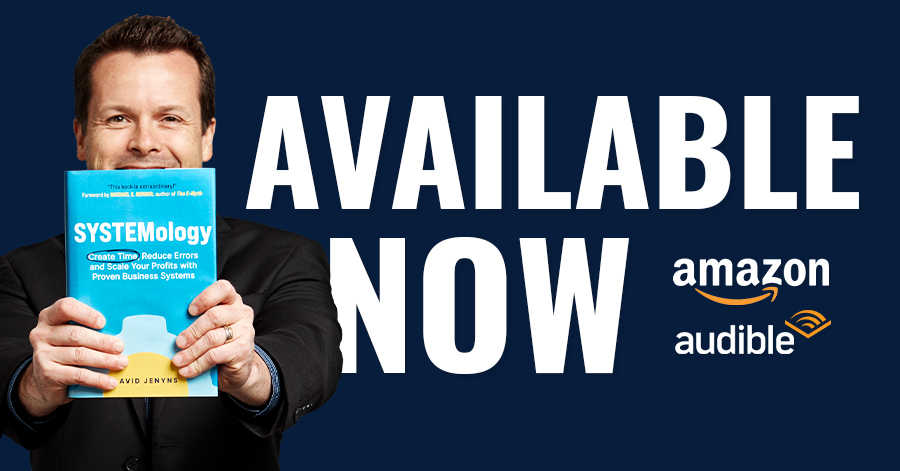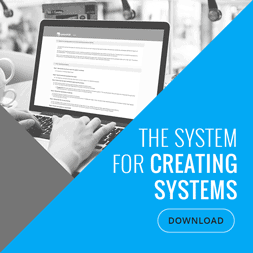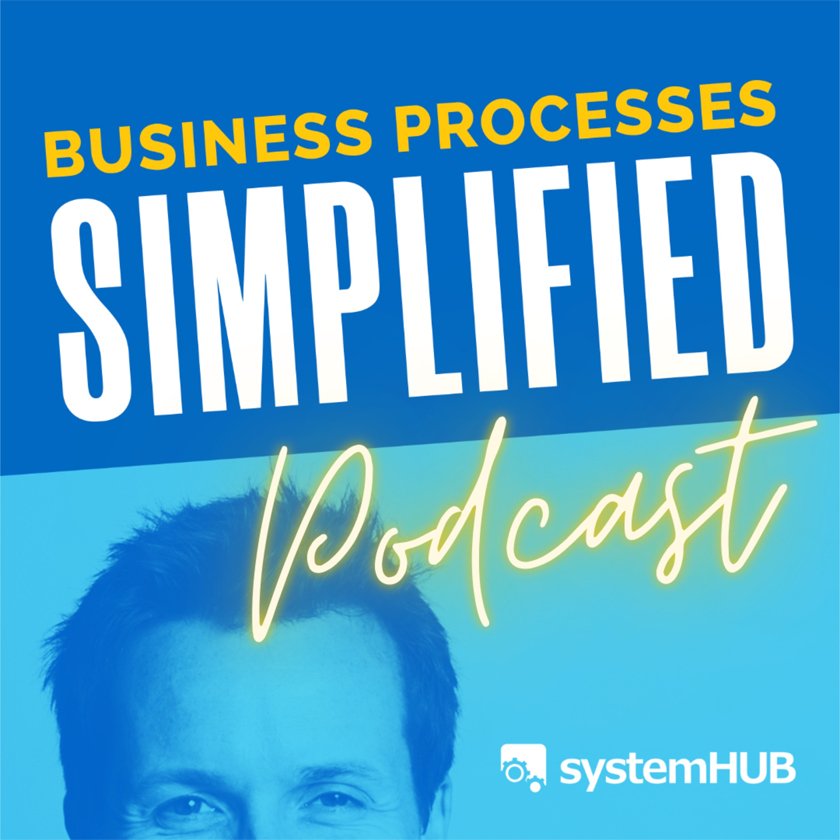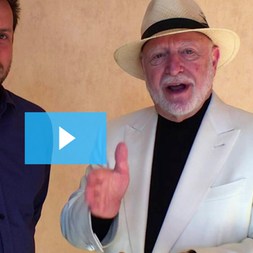50 Business Coaches Reveal Their ‘Secret’ Business Processes To…
Attract Higaher Quality Clients, Increase Team Efficiency, Automate Your Business, Reduce Stress & Triple Your Profits.
We all have this dream of building a profitable business that works without us yet most business owners get trapped in their businesses.
They can’t step away from for more than a day or two. They have built a machine that depends upon them and now they’re stuck. Worst still, this is directly opposite to what they were looking for when they started in business.
Business owners who originally sort freedom are now chained to their business…
How did you end up here? Why are you stuck? And more importantly…
How do you break free?
The answer sounds simple… but it’s easier said than done.
You must learn to remove yourself (the business owner) from the day-to-day operations. You must learn to clone yourself and your best team members so that the business can scale without single person dependency. You must evolve from being an employee of a business you own, to a business owner.
The solution to the problem lives in the development of your business systems. That is, the non-urgent but extremely important, detail orientated task of extracting, organising and optimising how your business functions.
The fact is, once your business is working without you, your life will change.
Now you probably already initiative know this. Perhaps you’ve read the books like the E-Myth, Traction, Scaling Up and Build To Sell – so you’re sold on the idea of creating systems. But…

“If you had to start your business over again, what’s the one business process or standard operating procedure (SOP) you’d implement from day one?”
And then we collated all of the answers for you below…
Ready to better systemize and scale your business?
Enjoy these business systems, process and systematization insights! And please remember to share them with other business owners you care about! Let’s dive right in.
Let’s take a look at our expert business coaches:

David Jenyns

Kim Argetsinger

Lauren Dailey

Ysmay Walsh

Peter Kozodoy

Michelle Clarke

Loren Fogelman

Shannon Lavenia

Ana Savuica

William Winterton

Lydia Sophia Wilmsen

Matt Sweetwood

Candy Motzek

Andrea Palten

Jaime Masters

Matthew Pollard

Melissa Liipfert

Barry Moltz

Tammy Adams

Avy-Loren Cohen

Tamara Simon

Melitta Campbell

Jill Maidment

Amira Irfan
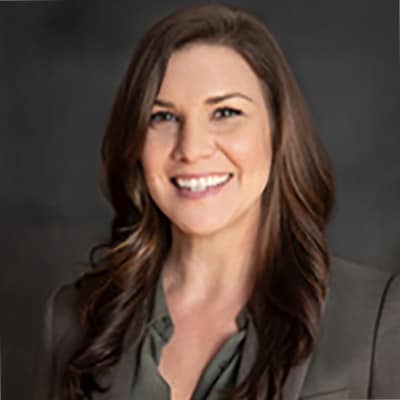
Bryn Brown

Sophie Kessner

Drew DuBoff

Reelika Schulte

Ronda Macrory

Eli Natoli

Yvonne Heimann

Mitch Durfee

James Kademan

Beverlee Rasmussen

Margaret Guillen

Lise Cartwright

Jodi-Kay Edwards

Annemarie Cross

Natasha Vorompiova

Robin Waite

Anthony John Amyx

Christi Bernard

Kelly Meerbott

Patrick Ewers

Jay Allen

Jennifer Dawn

Erin Garcia

Dani Jorgensen

Yvonne A Jones
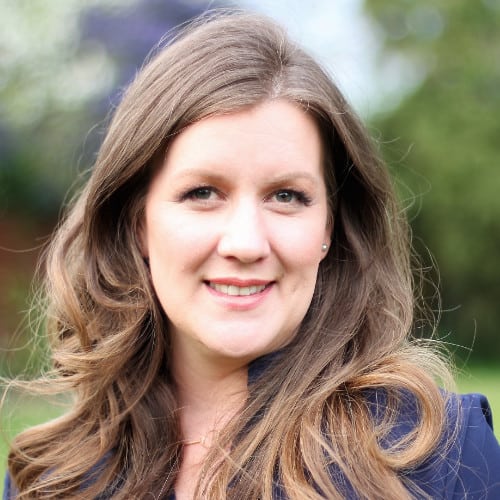
Henriette Danel

Corinne Blagg

The first and most important system any business owner can put in place is the system for creating systems. I know it sounds like a funny name but it’s serious business. Typically the business owner is the worst person within an organisation to be putting systems and processes into place. The sooner this is delegated to other capable team members, the sooner the business can begin to grow.
When I realised this, I realised all I needed was the master system to inform the creation of all future systems. Hence the “System For Creating Systems” was born. With this system, any team member can document, organize and optimize how they do things – this system completely takes you out of the loop!
Then, with each new system, you’re pushed further out of the daily grind as staff are able to complete tasks to a higher standard and with less support. If you’re interested to find out more, I’m happy to share this system with you – click here to download it.
“You must have a system for creating systems – it’s the most important business process of them all.”

Michelle Clarke
Business Acceleration Coach
If I had to start my business over again, the one system I’d implement from day one would be “Linking Strategic Goals to Promos System”.
This process took quite some time to refine, but once I had it up and running it saved me time, money, stopped the anxiety attacks and bouts of procrastination, and freed me up to focus on scaling up my business.
Without a clear promotional plan you can end up running around like a headless chicken lurching from one promotion to the next: online course promo, to book launch party, to another weekly challenge series, to blog direction, to yet another freebie… you get the picture, right? Maybe I have just described you? Do you feel like you are constantly launching something new and having it fall flat of your expectations? Then you are not alone, hundreds of my clients feel this way too.
In my experience of launching and taking several businesses to 6 figures (and coaching hundreds of other businesses to do the same) the one thing they all have in common are “lack of structure and planning leading to overwhelm”. But I hear you, it can damn hard to know how to get out of the overwhelm when you are at the center of it, so I am going to share part of my system with you.
Creating a promotional calendar is easy right? There are heaps of free templates out there for you to use, but are you using them effectively?
If you really want to get results from your promotional campaigns then those activities need to be linked to your strategic plan so that you end up exactly where you want to be.
In order to gain clarity, get better results from your promotions and reduce overwhelm, I would advise you to follow these steps (which are just part of my “Linking Strategic Goals to Promos” System).
- Review your Strategic Plan and Quarterly Goals
- Decide on one promotion to meet each of these strategic goals
- Clearly outline what you want: what will success look like? How many people do you need signed up for example?
- What one action do you want your target audience to take? – a confused mind will not buy so only ever include one option
- Design a value ladder: what will your opt in be? what actions do want to lead people to take
- Design your opt in: check what your audience really want and deliver that
- Create a funnel to lead people along your promotional plan
- Launch promo
- Measure results daily
- Tweak offerings until you have something that is working, and then keep the promotion going until you have reached your target
The consequences of not having the right systems in place is fatal. You are your business, and if you are so overwhelmed that you cannot focus you won’t end up where you want to be.
The benefits of having your systems documented are many:
- You will create brain space – once your systems are documented your brain will ‘let go’ of having to remember the process
- You will reduce overwhelm – because you know that you have your fail safe system to call on
- You will gain confidence – because you know what the next step is at any given stage
- You will gain motivation – when you know what needs to be done, it is easy to take the next step You will learn to take consistent action – when you know what needs to be done each and every day, you can start showing up authentically, and this will have you reach all your goals
- You will be able to upscale – when you have systems documented it is easy to up the ante
If you really want to boost your business success, then systems will become your best friend. Now I hear you, I get the resistance to systems… you feel like they will take your creativity and freedom away. But that does not seem to be a reality for all the businesses that I have worked with, using systems which have been designed to meet your specific needs and way of working, allowing you even more space and freedoms. Go on give it a try…
“Without a clear promotional plan you can end up running around like a headless chicken”

My answer to the question, what process or standard operating procedure I’d implement from day one might be a bit different to the answers you’ve heard! 🙂
I do business with an intuitive approach, based on energy and it has helped me to create a six figure business in several months, after being in business for years and never ever slightly reaching the high 5 figure threshold. My approach with clients as well is that you can easily step into massive business growth without a lot of procedures. When it’s about scaling your business I believe strongly in business automation, until then it hasn’t brought me the results I wished for, nor my clients.
People buy from people. People buy the energy you vibe. THIS is what they want. So the more you work on your energy, your mindset, your confidence (and obviously your message and using your story), the higher your closing rates.
I nowadays have conversion rates in my “sales calls” of almost 100%, because I only speak with the people who I have built a relationship with and who want to work with me.
What do I mean with working with energy? It means getting deeply acquainted with the future version of yourself, who has the success you wish for. It means thinking, feeling, behaving like and basically being that person you will be once you have accomplished those results you are longing for. And then start listening to your intuition. Do aligned actions which arise out of that deeper space in you. Trust and start following those intuitive hints. This means stepping away from linear thinking into a whole different universe of doing business.
I wish I had known this approach and implemented it from the beginning!
Nowadays I have a nurturing procedure to build relationships with my prospects through different social media channels, an onboarding process for new clients and me and my marketing team are building a full on business automation procedure. However, the base of all of that is and will be an energetic approach. I always follow my gut/intuition on what step comes next and what procedure is being implemented. And I am open to last minute changes if my feeling tells me so.
“People buy from people. People buy the energy you vibe. THIS is what they want.”

Without systems it’s just impossible to onboard staff or freelancers to help get out of your day-to-day of the business and truly have an impact on the world.
If I really had to pick one, it would be the SOP related to ensuring every process is documented and how to do it. I find so many people say they want SOP’s, once they are under water, however they should have been writing them all along. Then they hire someone or get their team to do it, but they are rushed together.
The number one SOP you should write is how you are going to document every process, every procedure. Then more importantly, you need to actually do that or hire a freelancer/team member to help. I’m a big fan of training through skype or zoom, then it’s as easy as pressing record and the first thing the trainee is directed to do is write the SOP from the training video.
Stress is cumulative so, while at first things will go wrong and you’ll be able to handle it, over time things will affect you more and more… until eventually you stop loving what you do or start blaming amazing team members for expensive mistakes that a good SOP could have avoided.
“Don’t blame amazing team members for expensive mistakes that a good SOP could have avoided.”

Tamara Simon
Speaker, Author, Coach, Solving problems for small businesses and RTOs with simple systems.
Visit Tamara’s Twitter
Develop your organisational chart so you can start to build processes around positions and not people. The first system I would document is the enquiry process which would nowadays include a gated lead magnet so you can start to build your email list.
Systems are everything and essential for business success. Unfortunately, because they initially take time to develop, business owners don’t do that because they’re too ‘busy’. But this means they are spending time and effort on re-inventing the wheel as they duplicate effort rather than spending the time needed to develop the right process the first time.
Lack of systems also mean increased mistakes, inconsistent customer service and service delivery, and knowledge walking out the door when staff leave because it’s not documented. I believe there’s a system in everything… you just have to find it.
“Develop your organisational chart so you can start to build processes around positions and not people”

Systems + procedures are the core of what I do in business, it’s what shifts my ability to operate from a place of flow, ease, pleasure + play instead of feeling like I’m constantly stressed, overwhelmed, scattered, and stuck in the hamster wheel of running a highly successful business. Developing and refining the *right* systems for ME have been imperative in my own ability to really grow + scale over the years.
Because of the processes we’ve integrated, I’ve been able to support multiple businesses in scaling to multi 6 & 7 figures over the course of months instead of years. It’s having a system + process that’s been proven, refined, and optimized time and time again that creates the efficiency and effectiveness for both myself + my clients in business. 🙂
The systems are what provide the structure and more masculine aspect of what I do that then create the space for me to operate more intuitively + in my feminine flow as a creative entrepreneur. Instead of basing business + marketing decisions solely off of “what feels good”, we actually have the data + systems in place to automate and streamline processes so we can project specific outcomes + results without having to wonder if it’s going to work.
Hence the massive sense of peace + relief these systems bring to running a coaching business.
If I had to start my business over again, the biggest system I’d but in place would be for client acquisition between my marketing and sales process. A lot of entrepreneurs have pieces that they focus on but they aren’t cohesive or congruent which creates a lot of leaks in their ability to actually scale their businesses and work with clients they’re genuinely excited about and aligned with.
What this means is having a proper market research system in place to fully understand the type of ideal client you want to be working with that’s ready to invest in your program.
You use this market research to create the brand positioning for your offer so it attracts clients who are aligned and ready to invest.
Then by having the proper sales systems integrated into your marketing, you’re able to prequalify your audience to ensure they are the right fit before spending + investing your time/energy on a sales call so you can increase your overall sales conversions.
The idea here is to create the highest conversion rate possible + ensure you’re attracting the most aligned audience possible so every person you are connecting with on a sales call or through your sales page is the perfect fit for your business and has a full in depth understanding of the work you do, the value you provide, and sees you as the expert you are in your space.
Hence why these systems need to be integrated and cohesive to create the best results possible. 🙂
When these systems aren’t in place, there’s usually gaps in your marketing.. a lack of lead generation, low quality lead generation, unqualified potential clients reaching out, no sales conversions, low sales conversions, and a lot of stress because even if you’re running all the marketing systems from ads to funnels, to social media content… if the messaging isn’t what it needs to be, NONE of it is going to convert or work appropriately.
So we have to start with the market research, build it into your messaging, and integrate it into your sales call pre-qualification process.
“Because of the processes we’ve integrated, I’ve been able to support multiple businesses in scaling..”

Time tracking and Project management
No matter who you listen to nowadays, everyone is telling you to outsource. Don’t do the $10/hour work yourself. You have to be the CEO.
That is all right and great advice, but what many don’t mention is the work and chaos outsourcing can cause when you haven’t done the preparation.
Picture this:
You find a Virtual Assistant that has been praised by many in your circles. You interview said VA and decide, these people are right – she’s awesome.
You tell her, I hate Social Media… go do it for me!
Now what? Sure, she can just post something… but what platform? What tools do you use? How often? What? How do you and your brand sound?
What have you done in the past? What worked, what didn’t?
And all this becomes even more difficult and intense the bigger the job.
Imagine how bad this can backfire if you outsource some of your client work!
A friend of mine, a Virtual Assistant, took off and got fully booked fast due to her amazing work.
She decided it would be great to be the boss and build a team of VA’s .
To this point, everything was great, till she handed of work without having workflows, processes, and time estimates ready for those tasks.
Her team couldn’t read her mind…
Work for clients got delivered in bad quality, late, or plain and simple wrong.
Two months later she lost 75% of her clientele, needed to fire her team, and start over.
Start recording your estimated time and actual need time for tasks early.
It helps you plan your time but also gives you a better idea about time commitments later when outsourcing.
Write down your processes and use a project management system as soon as possible
Even if it’s just you, implement a tool like ClickUp sooner rather than later.
If it’s just you, it eliminates the time wasted trying to figure out what’s next. No matter how often you have done a job, there’s always the moment of “what’s next? Did I do that yet?”
When you are ready to outsource, having all this ready to go will make your new VA or team member really happy – they don’t have to poke you with questions every 5 minutes.
Starting early with these will make your own business life so much less stressful and allow you to outsource without any major hiccups whenever you are ready.
“Write down your processes and use a project management system as soon as possible”

If I was starting my business over again, I’d make sure I set up my 90-Day Plan process. This is where I break down the 1-2 goals that I’m looking to achieve in the next 90 days. I take those goals and break down the steps that I need to take to reach that goal and then add them to a 90-day plan that is deadline driven and keeps me on track, so I never have to think “what am I meant to be doing today?”
As a solopreneur, which is how I started out, I never considered documenting processes, because it was just me. So when I started needed to outsource, it was a massive headache to get someone onboard fast enough for them to be able to help. But once I had those processes documented, it saved me time in having to train someone. Without these processes documented, it’s difficult to hand tasks off to someone else without you having to be involved.
“Create a 90-day plan that is deadline driven and keeps you on track, so you never have to think ‘what am I meant to be doing today?'”

I would have a process for creating and distributing my content each and every day.
We live in a time in history where in your in business you’re a media company. People want to consume content about you before they get to know you. It’s a very noisy marketplace. Having your own content helps a business build trust and respect with their target market faster and leads to more sales.
If you don’t have a process for this, then you’ll ride the content creation coaster. This is where some weeks you produce lots of content and then you may go months without producing content because you’re living in a reactive state.
As a result, you’ll become jaded and think to yourself that content marketing doesn’t work. And worse, you’ll buy leads and miss out on turning 70% or more of them into customers.
The content game is a long term play. Yet when coupled with paid traffic, it’s the game changer to having long term, sustainable success.
First. Get clear on how your target market likes to consume content. Is it written, audio or video? There’s no right or wrong. Simply, how do THEY want to consume content? After all, it’s always about them anyway.
From there simply create a spreadsheet with a workflow that outlines all the takes for the following:
- Organizing
- Writing
- Recording
- Editing
- Upload
- Distribution
- Publication
- Post Publication.
Then create another spreadsheet with your topics and follow the workflow.
In this case, tools are not really necessary because we are talking about the production of content.
Most people do not have a SOP for content creation.
“Having your own content helps a business build trust and respect with their target market faster and leads to more sales.”

If I was starting my business all over again, the very first process I would implement is how we make our money. You start a business to make money and it’s the money which will determine whether you stay in business or not. It’s super easy to get caught up in all the other logistics of running a company, but at the end of the day to stay in business, the money trail must be rock solid. Be super clear about how and where your money will come from and build the remaining processes from there.
Personally, I believe in standard processes but I’ve also seen it taken to an extreme where every process is documented in great detail – and then nobody bothers to read them. It takes a tremendous amount of staff time and energy to create a massive document that is too long for anyone to take seriously.
Instead, identify the top 20-30 core processes that drive 80% of what your business does.
Create a 1-2 page process that is clear and concise.
It may even take more work to do this because you’ll have to think about ways to streamline it so it’s most efficient. Keep these core processes in a central location where every employee can easily access.
Without clear, written processes it’s too easy for staff to just do things their own way, misinform customers, or be inefficient in completing tasks. This costs you, the business owner, in not just money but wasted time for your staff, vendors, and customers.
“Identify the top 20-30 core processes that drive 80% of what your business does.”

For me as a Strategic Business Coach, I feel if there’s one procedure or SOP that I would implement, if I had to start my business again…. It’s definitely a concrete Marketing Strategy.
I’ve coached so many women in business who all make the mistake of developing a product or service first, before applying a Marketing Strategy to get potential customers.
By not having a Marketing Strategy/ Procedure in place first, you’re not going to be able to communicate with your potential customers and find out what their problems are. By communicating with your potential customers, you’re also building a relationship and only now, can you develop your product or service to solve their problems. That’s when the Selling comes in (which is another Procedure you need).
In addition, if you’re starting to develop your product or service first, you could easily spend months on end (including lots of money) developing something you think your potential customers want. Then when you finally launch…. All you hear is crickets.
So for any business owner, having a procedure in place to Market your products or services first before developing it, is absolute key to your success.
And this is exactly what I teach my students and show them how to put this procedure in place.
“By not having a Marketing Strategy/ Procedure in place first, you’re not going to be able to communicate with your potential customers”

Do I have to pick just one? lol.
While I don’t think of myself as a processes person, there are many fundamental processes and systems that allow me to run a profitable, sustainable, and growing business I love with ease.
One process that serves me daily in my business that I wish I could go back and have first-year-in-business Kim implement is the way I store and repurpose content.
Creating and sharing original content has always been at the core of my relationship-based approach to marketing and sales and what I attribute so much of my business success.
That being said, I’ve got years of content that I add to weekly. Having an efficient way to organize, store, and repurpose this content allows me to continue to connect and grow my reach, impact, and income.
Having a simple standard operating procedure for how this content is stored and then repurposed allows me to have my VA support me in this process. This is game-changing in the marketing and time-efficiency department.
The consequences of not having this in place from the start? A lot of time spent hunting for old posts and pieces of content that weren’t saved. More time lost trying to tame a beast in a way that made sense and was easily replicable. And, I don’t have to tell you, time is our most valuable resource we can’t get back.
On the flip side, having a simple process that’s documented (we use loom to document this!) now means content isn’t lost, we get the most out of every piece of content, and it’s easy for someone help me on the backend with distributing and repurposing my content.
This also takes the guesswork out of what we’re doing and saves time that would otherwise be wasted on decision fatigue (another benefit to processes overall). Meaning, we’re not spending time each work figuring out what needs to be done or how to save and repurpose content because there’s a clear process in place.
In case you’re curious, we’re all about keeping it simple and use Google Docs and Google Drive to store content and images. Everything is organized by month and week, so it’s easy to find and pull up. We also document where content has been shared and when, so everyone is on the same page. Similarly, we use these documents to make any important notes, so it’s easy to communicate and save time with back-and-forth messaging.
Content is gold for your business. Having a process that allows you to store your content and efficiently repurpose it is priceless.
“This is game-changing in the marketing and time efficiency department.”

School technically trains us to be employees, not business owners. Because of that, I didn’t know how to price or sell my services.
As a sports psychologist turned business coach, I took a deep dive into the various pricing models. The research, courses and private coaching led to a system for entrepreneurs to break free from the dollars for hours trap.
At first, like many entrepreneurs, I lacked a system. I spoke to a lot of people who simply wanted free information.
Those conversations taught me a lot. Not everyone’s an ideal fit for my services.
People who want to pay the least, expect the most. I realized that competing on price isn’t my style.
Follow this 5 step system to double your income while working half the time.
- Determine your ideal client.
Not everyone is a great fit for your service. Identify the qualities of your ideal client. Go beyond the traditional demographics. Figure out their psychographics, that includes their personality and characteristics.
- Define your system.
The top 1% of all experts develop a system.
Whether you realize it, or not, you take a client through a series of steps.
Break down your process. Then focus on the outcome and benefits as you describe each step in your system.
- Develop your packages.
Rather than offer ala carte services, bundle services together. Consider cable companies that offer TV cable, internet and phone packages. Apply this concept to your service offerings. What would you include in your packages?
- Ditch the billable hour.
Your highest value lies in what you know, not what you do. Connect with the value of finally fixing your clients problem.
Then price your services according to that value. Hint: Your clients don’t really care how long it takes. In fact, a faster solution has more value than a long, drawn out one.
- Discover where your ideal client hangs out.
Don’t wait for your clients to discover you. Remaining a best kept secret is costly. Research where your ideal client hangs out. Then show up in those places. Attend their conferences, go to their network meetings and develop strategic alliances with referral partners.
Charging by the hour overlooks your expertise. Clients who value your solution will happily pay more than your hourly rate to fully solve their problem. Value based pricing is a game-changer. Once you connect with your value, you’ll attract clients who value what you do for them.
“Follow this system to double your income while working half the time.”

I would have a continuous process of exploring how to reinvent my business. A business owner needs to recognize there may be a problem ahead even when things are going well since that’s the best time to innovate and reinvent your business. The consequences for not doing that is that market conditions, technology, regulation, complacency, or competition can overtake you quickly and you’ll find your once successful business, in serious trouble.
Quick tips:
Identify your strengths.
If you have seen the problems ahead it is easy to get in panic mode and focus on what is wrong with your business. However, your business has been successful to this point, so you must be doing many things right. Identify those things so you can understand the assets you have which will allow you to pivot and reinvent the business.
Think about what kind of new business your assets can do.
This is the moment when you must be innovative and think about the many possibilities, inside and outside of your business.
Be bold, ignore the doubters, and just do it.
Use the expert knowledge you have of your business and industry to come up with a new way of doing things or an idea no one has thought of before.
“Be bold, ignore the doubters, and just do it”

As a coach, my work with clients is hands on and long term, so the relationship aspect is really important. Because of that, if I could go back I would have ensured that the clients I took on were aligned with my core values and big picture vision since my values drive my coaching approach and my big picture is what fuels me and gets me excited to start each day.
I didn’t do this in my first year of business and I experienced burnout. It felt like the work I was doing was pulling me in a different direction than where I wanted to go, and wasn’t aligned with what mattered to me and, ultimately, my business.
Your big picture gets blurred and your goals are thrown off track. It’s really easy to get distracted by the day-to-day busyness of life and work.
When we aren’t aligned with what we want to create, it’s very common to take on projects, clients, partners, etc. that just don’t fit that big picture.
The result is a lot of time, energy and resources spent on things that aren’t getting us closer to our ultimate business (or life) objectives.
When we have the processes in place to support our big picture, and we know that these are aligned with our core values and/or the core values of the organization, those processes keep us focused on the path that’s right for us, even when distractions crop up.
“It’s really easy to get distracted by the day-to-day busyness of life and work.”

I decided to start my business when I had my first child. I loved my corporate job, but wanted to work more flexibly than my leadership role would allow.
I set about building a business that would give me the freedom to work, while also being the Mum I wanted.
Since writing has always been a part of my work, I started there and offered a newsletter writing service for companies. I didn’t have a big network, but I had a good reputation and some strong connections with the right people, so I found my first clients with relative ease. As word spread, I won larger and larger projects and soon had more clients than I could handle.
But I never stopped to ask: How do I find the right clients? and What do I love doing?
Failing to identify my ideal client and ideal business, lead me to work around the clock doing work I didn’t care about. After 5 years, I was miserable and my health and confidence were suffering – I was racing head-first towards burn out.
Luckily I spotted this in time and made changes. I switched to a business where I could help women, while developing my own skills and mindset. Four years on, that business evolved and I became a business and communications mentor working with women to help them launch their own dream business and learn to communicate with greater impact and influence.
Today, I love sharing 25 years of communication, marketing and business knowledge through a series of programs that help women develop an entrepreneurial mindset, understand the core principles of success, and how to apply this to their own vision.
Following my own experiences, helping my clients gain the clarity needed to help them build a business that is based on their passions, plays to their strengths and serves people they care about is always the first piece of work I do with my clients.
The process would be to check in with your goals, vision and WHY – this will tell you what you need your business to deliver in order for it to be fulfilling.
Then conduct a SWOT to assess your strengths and opportunities – and outsource your weaknesses.
Cross reference this with an in-depth analysis of your ideal clients and you have the formula for building a business you love, that plays to your strengths and allows you to deliver results you care about.
“Failing to identify my ideal client and ideal business, lead me to work around the clock doing work I didn’t care about.”

The one process I would implement from the beginning is Mike Michalowicz’s Profit First accounting system. I wasn’t taking any money out of the business when I started, but that was a major mistake. I was also spending like crazy on different info and education products as well as software programs. Once I started working with a CFO and we implemented this system, the results have been amazing.
I’m now taking money out of my business to pay off my car and some student loans and this is just the beginning. I’ve also curbed my expenses to where I’m having 90% net income months.
If you don’t have any systems documented or in place, then your business can’t run as smoothly and efficiently as it should. You also then take the risk of not being able to hire people or outsource as you don’t have any processes to hand off to a virtual assistant.
Having systems helps you make decisions easily and a business owner, it allows you to spend the time on the high ROI tasks that you should be focusing on.
“Once I started working with a CFO and we implemented this system, the results have been amazing.”

If I was to start my company over one of the first procedures I would focus on in order to scale the organization would be my million dollar team!
When I was in the Army one of the things I despised most was being told little to no detail. We would be out on a combat mission and only the leaders would know where we were going, and what we were doing when we arrived.
After I started my own company I realized that I wasn’t alone in these feelings.
In order for a team to be able to run efficiently it requires 2 main things, a vision and organizational chart.
When everyone on the team knows what direction to run in, and what they are working towards they are able to dig deeper because they don’t want to disappoint the team.
Inside of having a vision I would also implement short term personal goals for each member on the team. (30, 60, 90) 30/60/90 day personal goals that align with the overall vision of the company.
For example If the companies Vision was to dramatically transform lives by creating massive returns through the purchase of real estate investments. Then a 30 day personal goal might be to identify 10 investment opportunities. A 60 Day goal might be to acquire one of those 10 properties, and a 90 day goal would be to Stabilize one of those investments.
Once the company has the vision, then you are able to build out the structure behind it.
However simultaneously one of the SOP’s that aligns with this is having the companies organizational chart mapped out. As the founder of the company, I if it was just myself then I would use the vision statement to identify the positions on the team that I would need to fill in order to make the vision come true.
For example, if our company is focused on acquiring real estate assets, Who would need to be on my team in order for that mission to come true.
(Admins, Investor Relations, Acquisitions Manager, Appointment Scheduler, Asset Managers,)
All of those positions would be filled by myself until I begin to hire those positions. Each one of those newly hired team members would know where their position on the boat was and would also know our companies vision that collectively as a team we are working towards. They would also be responsible for documenting and creating their own procedures so that as they grew through the ranks of the company, back filling their positions would become easier and easier over time.
When a company has a clear vision and an organization chart, the company has the foundation necessary for it to begin to build out the SOP’s necessary for its growth.
“In order for a team to be able to run efficiently it requires 2 main things, a vision and organizational chart.”

If I had to start my business all over again, I would be 100% comfortable doing that because of what I’m about to share with you.
A common mistake entrepreneurs make is getting caught up in the learning phase.
And while yes, learning is earning, what takes you from learning to earning is implementation.
We don’t know what we don’t know. One process I wish I would’ve created earlier was a Business Vision Plan. This is not a standard business plan, this is: how much money I want to make. How I’m going to raise the capital. A Business Vision Plan says…
This is where I’d like my business to be in three years.
These are the tools I need to make that happen.
These are the strategies I need to implement so I can earn.
Who are mentors I can learn from to bridge knowledge gaps?
So, instead of taking ten years to learn something, I try to learn something in ten hours.
This is the type of thinking that gets you results. Better questions get better answers and better answers get better results. Doing that one small tweak has helped me generate a lot more profit in my business, a lot faster. I learn what I need to know to form a plan and implement it for the desired results.
There were many times I spent way too long trying different strategies, free webinar after webinar, and felt overwhelmed. Trying to download various freebies and stick them together to fill in the missing parts left me exhausted, in debt and anxious.
A Business Vision Plan would have helped me learned much sooner, that if I wanted to sell my programs, I needed to learn how to communicate that to my audience. I needed to learn how to be a high-ticket closer. I needed to learn to speak to my niche in a way that’s going to have them say, ‘Heck yeah!’ not just ‘Mmmmmm, maybe I need that, maybe not.’ With that said, a Business Vision Plan would have helped me see that I needed to be having more real one-on-one conversations with people to actually build up these structures for myself. Doing market research, giving my audience what they wanted help with, not just what I thought they needed help with because a free webinar told me so.
Those are the things that a lot of entrepreneurs don’t think about. They dive right in and they say, “Well, I need this, I need that, I need to do this, I need to do those things.” Then they learn about it, or they listen, but don’t implement anything because they don’t see the big picture of how it fits into their specific plan for the next three, five or ten years.
If I had a Business Vision Plan in place when I first began, I would have realized that I needed to learn how to handle specific objections that even I had. For example; I said that I want to impact the lives of over 100,000 entrepreneurs in three years. I can reverse engineer that statement into a plan of implementation. Whereas before, had I said; “Well, as a business coach I just want to help other entrepreneurs build profitable businesses and scale their income.” Okay well, how am I going to measure my own success?
There is mindset work that had to go along with that as well. I had to get out of my own way. We don’t know what we don’t know, there needs to be time to honor that. Taking space or the time to be mindful about what we’re looking to learn, and how it fits into an overall picture is how to keep out of the trap of “shiny-object syndrome”. In a nutshell “shiny-object syndrome”, if you’re not familiar, is a cycle of being stuck in this perpetual state of chasing the nearest idea of feeling good versus something that contributes to an actual goal. This ends in burnout and overwhelm because we’re trying to make someone else’s plan or idea work for us.
This would often look like a ton of unread freebies that we downloaded but never read. The emails and PDFs just collect dust in our inbox making it feel like we HAVE the knowledge. It’s a false sense of accomplishment. It can make you think that you know this or know that, when in all reality learning about something doesn’t mean you know how to use what you have or haven’t learned. It’s when you implement and take action to see results that you begin to ‘know it’. To break this cycle we have to take a step back and say, “Well, how does this align, how does this fit with where I want to be, & where I want to go?” Often we realize that we try to implement strategies that didn’t align with the stage of life or business that we’re in NOW.
For me, when I first started, I did everything under the sun trying for results. I didn’t have a vision of where I wanted to be. I was all over the place trying to soak up free information, smashing buttons, just stuffing puzzle pieces places they didn’t belong. I may as well have been in my kitchen throwing spaghetti at the wall, hoping something would stick and morph into 5-star restaurant.
I knew I was great. But, I couldn’t figure out why my audience was only there for the free Costco handout samples. I spent so much time and money investing in the wrong things. This is a huge consequence of not knowing what you need to see your business grow. The game changed when I could take a step back and say, “Hey, I want to be a 7-figure business owner. How is that going to happen?” Better questions get better answers which lead to better results. I started to surround myself with other 7-figure business owners. It wasn’t that I needed another Facebook Ad strategy. It was that I needed to realize, “Okay, let me fix my mindset so I can scale my business. Who is a great person in my industry that can do this? Tony Robbins.” Done. From that check in, I made the decision to attend a Tony Robbins event where I was able to shake his hand.
I wouldn’t have been able to shake hands with Tony Robbins if I was still over here downloading these freebies, looking at random resources, watching webinars and being afraid of saying YES to a transformation. Fear stems from not having a clear vision of where you want to be and where you want to go; both in business and life.
If you want to go far, understand that YOU are your best resource. The magic is in you… create your Business Vision Plan before you waste another minute or another dollar getting caught up in the hype online.
Ask yourself; what’s specific and unique to you? What blueprint aligns with your vision and purpose? Once you create that you can use it to guide you to where you want to be in the next three, five, ten years.
“…create your business vision plan before you waste another minute or another dollar…”

Christi Bernard
Helping entrepreneurs with their personal branding so they can grow an audience that converts.
Visit Christi’s Pinterest
I’m likely going to go against the grain here. I don’t believe you need an elaborate system or funnel to get your business off the ground. If I could go back, I would have ignored learning about marketing through things like ads, blogs, webinars, etc. I would have just started with a commitment to learning about my target audience.
The very first system you need is pretty simple. It’s showing up with a message every single day to social media. Why social media? It’s a free tool to get instant feedback from your target audience. It’s free market research. Social media allows you to learn EXACTLY what motivates your ideal audience members and exactly what they connect with.
And yes even this SUPER SIMPLE objective still needs a system. You must support yourself in showing up daily and you must track your market research.
Take note of comments, what topics got engagement and if you are set up to take your audience further at this point be sure you are tracking the exact posts that lead to ACTION… hello, business growth!
If you fail to set yourself up with a plan and procedures to track your progress and efforts… you will miss out on momentum, valuable insights about your business and you may find yourself with a headache when it comes time to add to your team.
“The very first system you need is pretty simple”

Oh man, I wouldn’t want to start my business over again. Just the thought of having to start from scratch makes my head hurt and increases my heart rate. The excitement of being a new business owner mixed with the self-doubt of not knowing if you’re doing things “right” and the fear of working your tail off and not making a dime. It’s a crazy ride. But, it’s also the best self-development course anyone could take. You sure do learn and grow a lot as a business owner. And when you do get your first client or sell your first product it’s a magical feeling of accomplishment that I’m not sure you can get any other way.
And in order to keep that magical feeling as long as you can, I believe it’s important to have a client acquisition system as one of your first standard operating procedures.
A client acquisition system that includes client behavior guidelines, signed agreements, prep forms, online scheduling, online payment, and an automated welcome packet will keep the stress down, save you time and potentially even make you money.
No stress or time of tracking multiple emails back and forth with a potential client to find an appointment time that would work for both of you. Not having clients send you checks in the mail (that may never arrive) or arriving with cash in hand and you scrambling to find the correct change they need. No clients no-showing and you left not making any money for that time blocked off on your schedule. No clients showing up 30-min late for their 45-min appointment and expecting they’ll still get their 45-minutes of service. No clients wanting to end their service program mid-way and demanding a refund.
Keep that magical feeling of accomplishment for as long as you can by making it easy for clients to schedule and pay and by outlining clear boundaries and expectations upfront. Your clients will appreciate your organization and professionalism.
“Keep that magical feeling of accomplishment for as long as you can by making it easy for clients to schedule and pay”

Organizing files!!! The amount of time we spend finding this email copy or that graphic we have created 10 times already is crazy. Lots of time is wasted just trying to find things, as well as tons of money is wasted when we hire someone to do the work again.
I have clients that have blog posts or sales copy hidden in their files that if they just had a better system for organizing and finding those files they probably would have enough copy for an entirely new sales funnel or a year’s worth of blog posts.
Also, until you implement that system for organizing your files the situation just gets worse and you will have more and more files to just dig through later. The faster you get this system laid out the better.
“The faster you get this system laid out the better.”
If I had to start my business over again, I would implement a morning routine from day 1.
Having time to meditate, deep breath and work on creative ideation for your business rather than day-to-day operations is essential for your business success in the future.
Your clients and potential clients are looking to YOU for the next best way to do something. Without acting as this role in your business and giving yourself the time and space you need for development and alignment to your soul’s greatest calling, you will end up pivoting more than if you were to slow down and take time to attune to your purest, most true creative calling.
I have had to pivot very quickly and frequently as I grow as an entrepreneur and my business evolves, and a morning practice is essential for my progression in both my business and life.
This process ties in with SOP’s as a standard and minimum for all of my clients and employees to commit to… 5-30 minutes of meditation as a part of a healthy, integrated workplace.
“This process ties in with SOP’s as a standard and minimum for all of my clients and employees to commit to”

How you do business is an essential part of your brand. It’s the brand experience that drives your current and potential client’s opinion about your business and will be what motivates them to recommend you to others.
The process that has been a game-changer in our business is our intake system. It’s enabled us to 10x our business by creating an effortless, streamlined process that is pleasing to our prospects and efficient for our sales and project management team.
Our system is dialed in to draw in interest and immediately get the potential client into a sales conversation with a team member. From there, we move them smoothly through the sales process and to the close of sale.
We use a process that combines e-mail, Facebook chat and an automated quote to contract to invoice to payment system. It’s super streamlined so there’s no breakage in the system.
When a new client starts with me they always ask me to walk them through the system because it’s so smooth. Fortunately for them, implementing this system is part of our Brand Builder Enterprise package where we help businesses to establish their processes, which are a major reflection of their Brand.
Prior, our system was super clunky using Docusign and Google Docs and Stripe and call schedulers. My team struggled when someone paid prior to signing our very specific contract. We’d then have to go back and if they had any queries on the contract, it would add time into our project or we’d have to refund someone who wasn’t the ideal client for our business.
By having someone sign our contract prior to being able to pay for our services, we ensure everyone is very much aligned, the client is confident in what they are paying for and what we are delivering and my team is happy with the efficiency they are able to operate with.
“Our system is dialed in to draw in interest and immediately get the potential client into a sales conversation with a team member”

As an online life and leadership coach, one of my most important business assets is my email list. This group of individuals provides me with a steady stream of wonderful clients and income.
If I was starting over from scratch I would focus on building my email list from Day One. I would create multiple lead magnets and test them to find out what resonates best with my potential clients.
Many new online entrepreneurs try to create the ‘one’ perfect lead magnet and it takes them weeks, sometimes even months, to create something for distribution. They lose time and traction.
While they tinker, their best clients are looking elsewhere for help.
Truthfully, the business owner can’t know exactly what will speak to their target market. The only way to find out is to offer a variety of options and adjust the messaging. Test and more importantly create a system to support the testing and measurement of results.
There is a benefit to reducing an entrepreneur’s emotional attachment to their freebie by taking a scientific approach. Stay curious and experiment! Test, test and test some more, then document and capture the results. Once it’s optimized, lock the process in!
The benefits are many. The business owner now knows what worked well and the steps they took to get these specific and measurable results so they can minimize future missteps. In addition, by thoroughly documenting the process, the entrepreneur can now leverage their time and efforts even further by outsourcing future list building efforts.
“Test, test and test some more, then document and capture the results”

People + Processes = Profit
If you do not have the right processes in place, then everyday is an improvisation for your team.
Processes give your team superpowers to improve the effectiveness of their work!
“If you do not have the right processes in place, then everyday is an improvisation for your team.”

I recommend to all my clients that they diarize ‘Strategic Thinking Time’ for at least 30 minutes a week; this prevents them from being too operational and allows them to review what’s working and what’s not; they can then see what needs to be improved.
Blocking off time to regularly review the company vision, strategy and business plan ensures that you align people, tasks, activities and systems. This allows leaders and business owners to work ‘on’ the business as opposed to ‘in’ it.
This sounds easier than it is, as often Founders in particular end up working long hours delivering their products and services before they can recruit and train up staff; additionally, they can often find it difficult to delegate.
Being ruthless about this behaviour so that it becomes a weekly habit can pay dividends and ensure business success.
“This allows leaders and business owners to work ‘on’ the business as opposed to ‘in’ it.”

If I had to start my business over, I would start building my email list from day one. Email marketing is the best way to build relationships with potential customers and enroll new clients. Your email list is your business asset and allows you to be in control of your marketing and sales.
I would create a free training, such as a webinar, to start building my email list.
Webinars attract high quality clients and provide lots of value. I would set up an email campaign, and landing page to collect the leads. There are many ways to attract leads, but my favorite one is Facebook ads and Facebook live videos.
“Your email list is your business asset and allows you to be in control of your marketing and sales.”

It may be littered with irony in answer to your question, but in my businesses, we have learned to document everything. That is to say, create a system, typically a simple checklist, for every action that needs to happen. I have my new coaching clients do this as well with their businesses.
The reason being is that we need every team member to be able to jump in the seat of another team member and to be mildly sure they will not mess something up for one of our clients.
We have so many spinning plates, that we want them to be easily passed between crew members as those crew members go to lunch, take vacations or leave on a more permanent basis.
In addition, creating and documenting these systems allows our crew to make improvements and actually allows us to see a trail of improvements, rather than shooting from the hip and hoping for the best.
Finally, these systems help us keep things consistent between clients, so clients know what to expect and know that what they pay us for will get done better than anyone else could do it for them. Arguably, including themselves.
“…create a system, typically a simple checklist, for every action that needs to happen”

If I were to start my business again the documented process I would absolutely have in place would be my company’s Strategic Plan, which would include our core values, our vision, mission and our main goals to keep our entire team (and me as the leader of my team) focused and aligned with our core mission and purpose.
As a multi-passionate entrepreneur and avid learner, (who loves and can easily be distracted by bright shiny new objects and new creative projects), having this document in place would keep me focused, working on the right activities that I know is required for steady and sustainable business growth.
“… having this document in place would keep me focused, working on the right activities…”

A contract created by an attorney. It took me about eight years to develop a contract with an attorney that protects both the client and myself. With coaching the asset I have to share is my brain and intellectual property. Prior to having the contract in place that we have now, several clients took advantage of my business and we ended up losing thousands of dollars. Now, we have a contract in place that is clear regarding expectations and deliverables and protects both parties.
What are the consequences of not having the right documented processes in place?
Loss of productivity and profitability.
“What are the consequences of not having the right documented processes in place?”

I’d have set up an automated email sequence in convertkit to welcome my subscribers. I think it’s important to nurture a relationship with one’s audience, to let them know what to expect, and be available for questions they might have.
It’s reassurance that joining the email list was a smart move for them. And by continuing to talk to them, I can help them solve their problems.
“I think it’s important to nurture a relationship with one’s audience…”

First and foremost I would streamline my audience growth process. Without an audience it’s very hard to sell anything in today’s times.
Start building the audience before you have a product or service built out. Design an SOP for audience growth that can run without your daily involvement so you can then turn your focus to nurturing the audience, and then product creation.
When you don’t have processes, you waste time and make errors, sometimes costly errors. Having good, well-documented SOP’s can save you unprecedented amounts of time and money that can be allocated to other areas of your business.
“When you don’t have processes, you waste time and make errors, sometimes costly errors.”

If I were to start my business again, I would implement relevant email funnels right from the get-go, and have them set up before I focus on growing my website traffic.
Getting readers from new subscribers to loyal fans (that actually open your emails) is such an important part of generating leads, getting booked for your services or selling digital products, and having an email list has proven to be an amazing tool for that.
So I would put more focus into setting up the back end of my email list so that I can take new subscribers on that journey, deliver value, build trust and create long-lasting connections that result in revenue.
If you need help setting up your email list, check out my article on how to start, manage and grow your email list here.
“Getting readers from new subscribers to loyal fans (that actually open your emails) is such an important part of generating leads”
If I could turn back time and go back to Day 1 in my business, I would begin building my email database right away!!! As the owner of my Marketing Coaching business, I teach my students this. I make it a vital point that they have to do this immediately, because I wish I would have concentrated on lead generation and relationship building immediately.
Having a system in place right away that generates leads by giving away free eBooks or Guides would have been so smart. I would build my thought leadership proof quicker, I would have had people to sell to earlier, and I would have had brand loyalists right away that promoted my business through word-of-mouth.
Getting into a conversation from day one is a great way to build trust and relationships.
“Getting into a conversation from day one is a great way to build trust and relationships.”

When working with local business owners, the one process they typically wish they had started from day one is committing to a set time each week to work “ON” their business vs just “in” the business.
Typically, the business begins to grow and they just bounce job to job only to wake up one day with no set systems in place nor the time to stop and work on them.
By having this part of the daily routine from day one allows you to put the remaining processes in place much earlier.
“By having this part of the daily routine from day one allows you to put the remaining processes in place much earlier.”

For me, time is money. So it’s very important to maximize your time, stay organized and be productive when it comes to running a successful business.
You have to be organized and have systems and processes in place to ensure your business is running smoothly and effectively. Otherwise you risk losing time, money and not achieving the results you desire.
To work smarter, I put my business tasks into different categories and create checklists to help me complete those tasks quickly.
For example, I’ve a checklist for writing a blog post, guest post, creating a product, etc.
Putting my business tasks into different categories like process, tools, budget, social media marketing, etc creates a system that you can easily track, analyze, automate as needed and see what’s working or not for your business.
I use Asana to monitor and document my tasks daily.
This kind of process makes your business more streamlined and profitable in the end.
“This kind of process makes your business more streamlined and profitable in the end.”

I worked in the commercial claims world for more years than I care to remember. One of the things I learned (a couple of times the hard way) during my time there was… if it’s not documented, it didn’t happen. And those experiences helped me form much better habits. One of the best habits was (and still is) contact relationship management.
Here’s why that’s so important…
Contact relationship management is like a personal assistant for your brain. No matter what your business is, don’t rely on your brain to remember things. Brains are too valuable to use as storage. They’re better designed for creative activities and problem solving. Not mere note taking.
Ever said this, “Hmm…I better make a mental note of that.” When you have any business interaction or complete an activity, you should document it.
Remember, if it’s not documented, it’s like it didn’t happen.
Something I like to do, after every note, is add an action plan. I put it in a section at the end to remind myself (or remind someone who helps me) what comes next.
A quick example is *Note: Joe just emailed me his new phone number. And the action plan I add at the end is: *Be sure to update Joe’s new phone number in the CRM.
Document all your business activities that way, and you won’t have to recall what took place OR what to do next.
“Contact relationship management is like a personal assistant for your brain.”

It is an exciting and terrifying time for small business owners hiring their first few employees. The promise of finally having help and the fear of taking on such a huge responsibility.
As you start to offload work that you currently have to do, you can look forward to getting more done and move forward building your dream . This is a huge step forward.
Unfortunately, unless you have a system in place to ensure these individuals are doing things the way you want them done these new employees chance of success working for you is significantly compromised. Worse, you may end up both paying a new hire AND doing the work yourself.
Been There, Done That? Have You Ever Said, “It’s Faster For Me To Do It”?
How then, when you are already so busy, do you find the time and resources to stop long enough to ensure success for both you the employer and the newly hired employee?
If you happen to own a well-organized franchise and/or have fully developed your policies & procedures manuals then training becomes easy. If not, consider having each new hire help you document the systems for you as they learn them. Before you know it, you will have all the most important tasks that each employee is responsible for in your operations manual ready for the next hire.
Having your employees involved in the documentation and continuous improvement of systems empowers individuals to positively contribute to your company’s success. Invite new hires to be curious and to ask questions during training on why you do things the way you want them done.
Your training system needs to include process AND purpose. Show your team what you need done and include why you believe this is the best way to do. At the same time, be open to questions and feedback on better ways to do things.
Be sure to create a checklist of systems that are essential to document and master, it makes the learning much more fun if your employee can see their progress by checking each one off the list.
Training your team ensures that you can keep your promise to your customers and is a huge step forward to greater personal freedom for you.
“Your training system needs to include process AND purpose”

If I were to start a business for the first time, I wouldn’t worry about any operating procedures from day one. Spending time creating processes early on is a waste of time. The main priority for that stage is creating consistent cash flow.
That’s not to say that you should allow things to be chaotic. What any business owner should strive for is order, clarity of vision, and focused execution. However, in the very beginning, it’s all about experimenting – experimenting with your messaging, different marketing channels, even service delivery. Things change very fast in a newly created business.
That’s why there is no point formalizing processes at that stage. Keep track of what works and what doesn’t, create checklists to save yourself time figuring out how something needs to be done, but leave yourself room for pivoting based on the feedback you receive.
The time to create systems is when you are clear about your ways of acquiring new customers (which becomes your marketing and lead generation systems), converting prospects into paying clients (which becomes your sales system), and delivering your product or service (which is your product/service production and delivery systems).
At that stage systems become the backbone of your business. They help you to operate efficiently, deliver consistent amazing customer experience, and grow your team, so that you don’t have to be involved in the business operations on a day-to-day basis.
So, systems are crucial to a business. But just as crucial is knowing when to start investing in them
“What any business owner should strive for is order, clarity of vision, and focused execution”

I think I can speak on behalf of Mindmaven that the single most important process we want to put in place from day one would be an effective, consistent and predictable way to build and manage relationships.
We’re big believers that the best things in life come from relationships but too often we leave them to chance. The problem with leaving anything to chance is the likelihood of it becoming successful and valuable is slim to none. More specifically, I’d ensure we had a process in place to identify the most valuable people in our network and ensure we’re following up with them every 45 – 60 days with content that is meaningful, valuable or relevant.
Not having the right documented processes in place simply leaves too much room for error and too much to chance. To successfully delegate a task to someone on your team, you need to have the confidence that they’re going to do it at the same level of quality as you or higher. The only way to accomplish this is by having clearly documented step by step processes that your teams can review. Without them, unnecessary mistakes are made, training times get multiplied, and the end results will suffer.
“The problem with leaving anything to chance is the likelihood of it becoming successful and valuable is slim to none”

In October 2008 when I started my online business I had no idea what I was going to do. I dissolved my Corporation, and at the end of a six-week training class the trainer spoke about starting a business online.
This was a new concept and I took the plunge. I have always enjoyed writing and enrolled in an Article Marketing training class. For the first 12 months I wrote articles and did affiliate marketing. However, I knew nothing about WordPress and used a free Google blog which did not have a landing page or an opt-in box. I lost out on numerous opportunities to start building an email list.
Whether you have an online business or you have an offline business with an online presence, it’s important that you begin building your email list immediately by offering an item of value in exchange for your readers’ name and email address. In addition, you want to build strong relationships with the people who have raised their hand to hear from you. As you create this system, make sure to document the steps and keep those records in a binder.
By failing to collect names and build your email list, you often lose the opportunity to stay in contact with those persons. Your email list is one of your most valuable assets in your business.
“Your email list is one of your most valuable assets in your business.”

The one process I’ve become obsessed with as a business owner is automation. Every activity we do as entrepreneurs has an opportunity cost, and when I’m coaching startup founders, I’m mostly concerned with what they are doing that they shouldn’t be doing.
To that end, it’s always a good habit to seek tools that can automate your life. For me, tools like Calendly, IFTTT, Zapier, and SocialBee have been instrumental in freeing up my time and making it easier to get the administrative and social media action items done quickly so I can focus on the tasks that require more brainpower.
Overall, I’m a big fan of staying in your sweet spot as a technique to increase productivity (and results), so my advice is that if you can automate it, find a way — and automate everything you can!
“it’s always a good habit to seek tools that can automate your life”

If I had to start my business over again, I would keep better track of my social media marketing. When I first got started I would just post stuff randomly, all over social media. Sometimes things would. Most of the times things just got absorbed into the noise.
I didn’t have anything in place to track the metrics. What posts worked? Why did they work? What was the reaction, and how could I capitalize on it?
Not having a social media system in place is a recipe for lost time, frustration and a really dry inkwell of content ideas.
“Not having a social media system in place is a recipe for lost time, frustration and a really dry inkwell of content ideas.”

The one process I’d refine would be how to prospect – if you have a business, before we need to duplicate a repeatable process – we need to make sure we have a pathway to getting more clients/products saying yes. And since when you get busy with client delivery or other things, the prospecting/marketing side tends to slip, and then you have big hills and valleys with revenue. So finding a repeatable working system to produce qualified prospects would be the number one!
There are short term consequences, and long term. Short term you aren’t be effective if you are reinventing the wheel each time. Your team will be frustrated potentially and you’ll drain a lot of your own energy stepping in to help or make decisions. Long term, if anything happens to you, OR to a key employee then your business will really suffer.
“You need to make sure we have a pathway to getting more clients/products saying yes”

What I would do over if granted the chance would be to create a SOP for tech stack selection. The reason for this is that there are a plethora of software options in both traditional and Saas forms, each with their own spin on the types of services they offer, the pricing strategies, and especially at the beginning – in their free model.
When a company looks at sales, marketing, data storage, digital security, email, scheduling, team work, online meeting and communication services and the list goes on, there are numerous factors for selecting a platform (to represent traditional software or Saas).
There are issues relating to team members familiarity with a platform and what the learning curve would be to properly use it to the required capabilities, the plans affordability, its ability to seamlessly integrate with various platforms currently being used, the reliability of a service, and on top of this, its ability to migrate to another platform in the event that you outgrow your existing platform – in the scenario where the existing platform will not be best suited for growth requirements.
When a company is moving quickly, especially when you are in a small team, every minute counts of each individual’s time and therefore researching into ever platform costs valuable time, and money and when you use a platform and you realize that it is not best suited, well you have also wasted more time and then more time to investigate another platform. As a SOP, I would have brought in at an early stage, an individual who would be responsible for developing the tech stack for the company over the growth journey.
The strategy would have been developed with all the core team founders and some other key senior team members relevant to the decision process along with the tech stack specialist. A strategy would have been developed with clear decision making parameters that could be transferred into a templated questionnaire key in a spreadsheet or a quick and simple (AI) software decision making tree app…
… but with the results the human element (tech stack specialist) would then come into the process to better evaluate each platform as you would not be able to make the automation process to complicated or arduous – so it would be designed to speed up the process where automation can be used, but then handed off to the human decision making component for the final decision visa-vie the tech stack specialist.
This could save quite a bit of time and money and speed up the pace for overall learning curve of the team, productivity, performance and reduce the stress of the team.
“This could save quite a bit of time and money”

Truthfully, it’s difficult to imagine starting my business over again and only implementing one process as the most important from day one. So, maybe this is my 20 years of sales experience talking but the truth is: you don’t have a business if you don’t have any sales.
Establishing a sales process should be the first priority for any entrepreneur once they have a viable service or product offering. It doesn’t have to be complicated or drawn out but it should be well-defined and duplicable.
There is tremendous value in having a sales process in place because it allows you to guide your potential customer into the next conversation and decision. It also helps establish you as a leader and makes it so much easier for them to say yes. Plus, if something’s going wrong, it’s easy to see where the drop-off is happening and you can make adjustments from there. Many of my clients come to me with a fear of sales and no clear process in place. Just getting this process established alone can help curb the fear of being salesy and give clients the confidence to move through sales conversations with greater ease.
As a former sales professional, it was intuitive for me to prioritize establishing a sales process from the get-go in my business. What I didn’t do – and absolutely would do differently if I had a do-over – was take the time to put the right tools in place to support me in my sales goals.
I didn’t have a CRM to help keep me on track and that cost me in the beginning. I thought I was too small of a business and could keep track through spreadsheets and emails. That was a big mistake! In the early days, I left a lot on the table with late or missed follow ups and potential clients otherwise falling through the cracks.
Now, I use a project management tool that serves as a client database and workflow tracker so I know where I am with any current or potential client at any time. Having access to email reminders and customer notes all in one place is essential if you want to improve your sales skills, increase your conversion rates, and improve client retention.
Creating a habit of tracking your leads and customers early on will pay off in spades as your business grows. Not to mention it will save you loads of time and allow you to bring on support staff with ease.
I suggest that you don’t wait to get your sales process and CRM in place. Seek out some support if needed, your business will thank you!
“The system doesn’t have to be complicated or drawn out but it should be well-defined and duplicable.”

If I had to start my business over again, the very first thing I’d do is spend the time to create my own unique framework for my core offer (my core service or product).
The exact process you take your customers and/or clients through to transform their situation for the better — is essentially your framework.
It’s your unique process, your unique way of getting results.
If you take the time up front to outline this process, you’ll outshine and outperform
80% of your peers in your niche, trying to sell the same service or product – and here’s why:
- The process is exclusive to you. This is your individualized way of getting that particular outcome. Nobody else is doing it that way, which instantly and immediately separates you from everyone else.
- You have taken something complex and made it simple. You’ve done that by taking a non-tangible thing (your outcome) and turning it into a tangible thing (a visual step-by-step process). This allows you to communicate — in clear, specific detail — how you’re able to get someone the results you are promising. Which is the key to effectively communicating the value you provide.
- You are triggering an honest, emotional response. When your prospects see visually how you are able to take them from point A to point B, they get it. That understanding triggers an emotional response and — as you know — all buying decisions are emotional, not logical. So you’ll have a much easier time selling your offering to them.
Ultimately what it comes down to is this: many (too many) business owners talk all day long about the features and benefits of their services and products.
When you take a different approach and outline your process, your path, instead, you’re clearly separating yourself from them.
How? By telling them exactly how to get there, instead of boasting about all the things you do (or your product does).
“If you take the time up front to outline this process, you’ll outshine and outperform
80% of your peers in your niche”

When I started my business even though I had experience in business, marketing and sales I struggle to attract clients. Mainly because I wanted to help everybody and this was difficult to market.
No business, particularly a small one can be all things to all people. Luckily for me I figured out this quickly and implemented simple 5 step systems I call 5P’s which I teach my clients who want to attract more ideal clients and grow business.
I will share 4 P’s from my signature system today.
- Person – Know who is your target market/ ideal client
Who specifically are you targeting, who is your service/product for?
- Problem- What is the problem (ideally big or painful, urgent problem) these people need solving. People pay for their problems to be solved
- Product/Promise – Your Specific Solution
What can you promise to them? What exactly are you going to sell that solves their problem? What is the result you can get them?
- Profit – your money map
Finance – you need strong system where easily you can access how much income, expenses, expenses your business is generating.
“No business, particularly a small one can be all things to all people.”

Codrut Video – Optimised from Robin Waite – Business Coach on Vimeo.
It would have to be automated diary booking (via Acuity) and call recording (via Zoom). At Fearless Business we run approximately 50+ Strategy Sessions per month, and various other calls between our coaches and clients. So when a new opportunity comes in we can simply send people a link to a booking on our website and the rest happens automatically. So they:
- Schedule their call via Acuity
- It automatically adds the appointment into our Office 365 calendars
- Creating a Zoom link in the process
- And then the calls are recorded into the cloud (so clients can refer back to them)
This one process saves us hours of time weekly.
And to give you an example of how powerful a process it is. Just before I went away on holiday I spotted three enquiries that had come in but not moved onto book a call.
I sent each a reminder email and a link to book, by the end of the day two had booked, and by the time I returned from holiday so had the third.
I’ve already closed two out of the three clients, within a few days. Prior to this we would have simply dropped the ball and gone away on holiday and probably never heard from these clients again. But it took 5 minutes to set up reminders and away we go.
===
I hope you got significant value from this post, and that you’re ready to shift your mindset and implement some important procedures to help grow and scale your business for the coming months.
If you’ve come this far, then I want to hear from you!
How are you using systems and processes in your day-to-day activities, and what do you consider an essential standard operating procedure in your business?
Your comments are important to us because your opinion will help us deliver more significant business insights and solutions, while helping business coaches, service providers and agencies across the globe to better systemize their business, increase profit and impact the world.
“This one process saves us hours of time weekly.”



